Guinea pigs are quite docile and calm pets. They are happier when they live in pairs or groups. Some say that rabbits are also loving, social, intelligent. On the other hand, others say that they’re bad-tempered and unaffectionate beings. Either way, both animals enjoy freely exploring and running – no stress involved. But what about if someone decides to have both of them in the same house?
Rabbits and guinea pigs are incompatible and they can’t live together. If they are housed together, there is a possibility of rabbit injuring the guinea pig due to their size (physical harm), or unintentionally (carrying harmful bacteria). Guinea pigs are very small and fragile in comparison to rabbits.
Table of Content
Guinea Pig and Rabbit | Do Rabbits and Guinea Pigs Get Along?
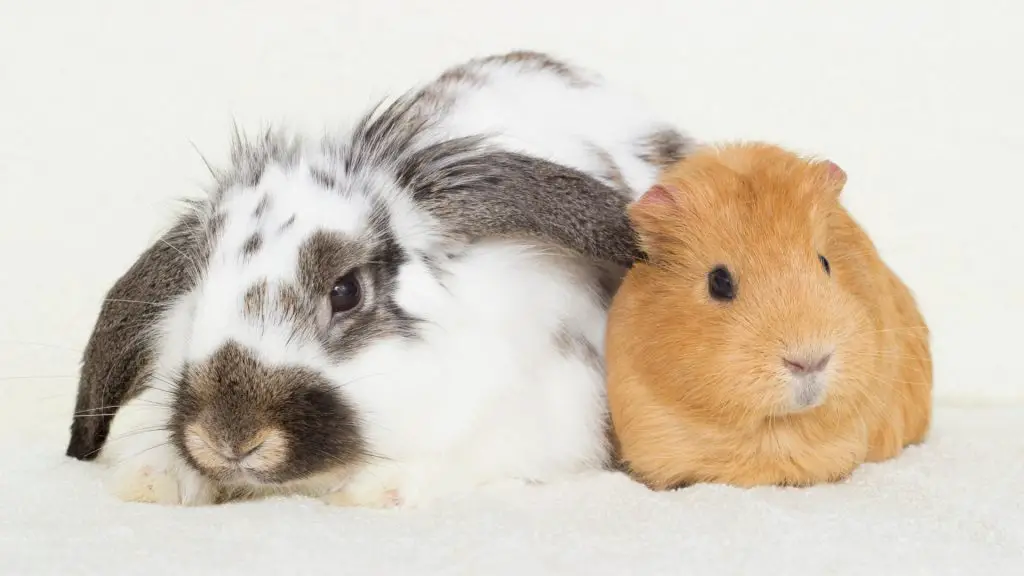
Considering that you shouldn’t keep a rabbit and guinea pig in the same cage, it is important to know the exact reasons why they don’t get along together. The following are some of those reasons:
1.Rabbits Bully Guinea Pigs
Bunnies may use their greater size and strength to scare guinea pigs away from a shared food bowl, for example. Rabbits often kick and mount (hump) when feeling fearful, annoyed, or startled. With this, they can stress out their smaller companion and possibly damage its spine.
Sometimes, the larger animal may even corner the guinea pig by biting it or “playing” with it out of entertainment or boredom. Guinea pigs need adequate room and nutrients. Otherwise, they will be unhappy, stressed, and might even hurt themselves.
In order to reduce aggressive behavior, it’s recommended to spay or neuter the bunny. Losing the urge to mate makes it calm and loving. Besides, spayed rabbits are easier to train and are significantly less dangerous to other animals.
In case the pair are getting along, they shouldn’t be separated because they have gotten used to each other. However, guinea pigs need constant access to a personal “safe space” that a rabbit isn’t able to enter, and creating this space can be tricky.
2. Anxiety
Rabbits are prey animals, meaning that they’re quite prone to anxiety. Some signs that a rabbit is stressed are when it curls up, paws tucked under its body with drooping ears and fast breathing.
Some symptoms that can be noticed over time are increased grooming and scratching, followed by aggressive behavior like biting the bars of their cage or destroying the inside things. This behavior can be a serious problem with rabbits because unlike, guinea pigs who are otherwise calmer and less aggressive in nature, can easily get stressed and depressed from this rabbit’s behavior.
It’s important for rabbits to have sufficient cage space and to have running time and space every day for them to stay calm. Secondly, they get used to certain environments, people, smells, and noises. Any sudden change is very stressful for a rabbit and should be avoided. Guinea pig and rabbit can negatively affect each other behaviors, causing them to both develop anxiety and depression.
3. Behavioral Differences
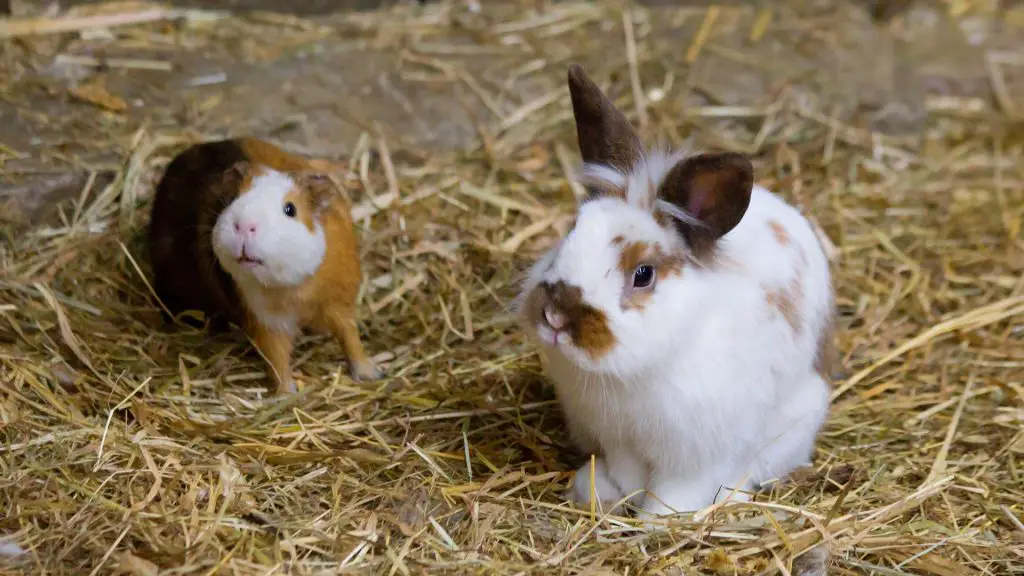
They also have their differences behavior-wise. Rabbits are prone to behavioral problems. They scratch, bite, and kick, especially when they reach puberty. This can happen because of hormones, mistreatment, etc.
Neutering/spaying should be considered at around four months of age. Castrating males is vital in order to avoid fighting and unwanted breeding that often stems from sexual frustration – characterized by mounting, circling, lunging, and general destructiveness.
Other advantages of spaying rabbits are a reduction in urine spraying (marking territory) and nipping. Excretions lose part of their stench, and the rabbit is easier to litter train. However, it’s important to note that it may take up to several weeks for these improvements to start taking place.
Contrarily, aggressive sexual (or non-sexual) behavior in guinea pigs doesn’t significantly decline when they’re neutered. Guinea pigs are relatively docile. They’re fleeing prey animals that only resort to aggression for immediate self-defense. Therefore, neutering is not necessary unless it’s for medical or reproductive reasons.
4. Rabbits are Carriers of Bordetella and Pasteurella
Bordetella is the most common bacterial respiratory tract infection among guinea pigs. It’s usually transmitted through the air from other sick animals when they cough or sneeze. A sexually transmitted genital version exists as well. In both cases, this disease has high mortality rates in guinea pigs, so it’s important to notice general symptoms, such as the following:
- Fever
- Dullness or depression
- Loss of appetite that results in weight loss
- Breathing problems and nasal discharge
- Female infertility
- Miscarriage
- Calcium deficiencies during pregnancy or nursing
Pasteurella is another infection that affects both animals, causing abscesses in various organs, but mostly in the upper respiratory tract. In most cases, rabbits exhibit no symptoms. The bacteria can reside in the nasal cavity without causing problems. However, maintaining a strong immune system is crucial to avoid sickness.
A rabbit’s physical strength depends on its emotional wellbeing, which in turn depends on contentment and low-stress. Rabbits and guinea pigs are most active at dawn and dusk, but their sleep schedule and the amount of sleep is vastly different. This causes a serious disturbance that leads to irritation and exhaustion, weakening both animals.
Another difference between these animals is their sensitivity to temperature. Rabbits can live indoors and outdoors. However, the guinea pigs’ bodies experience high stress when exposed to drastic temperatures. This can hurt their immune system. In addition, a clean cage and air are extremely important for keeping them healthy. Chemicals and smoke can cause problems in the upper respiratory tract, which as a result can trigger the disease.
What makes Pasteurella in rabbits dangerous to guinea pigs is the high risk of infection. This bacteria is mostly transmitted through infected saliva from biting or scratching. It is something that rabbits often do to guinea pigs. When the two are housed together, guinea pigs are exposed to these bacteria and become much more susceptible to future health complications.
Situational Cases When Guinea Pigs and Rabbits Get Along
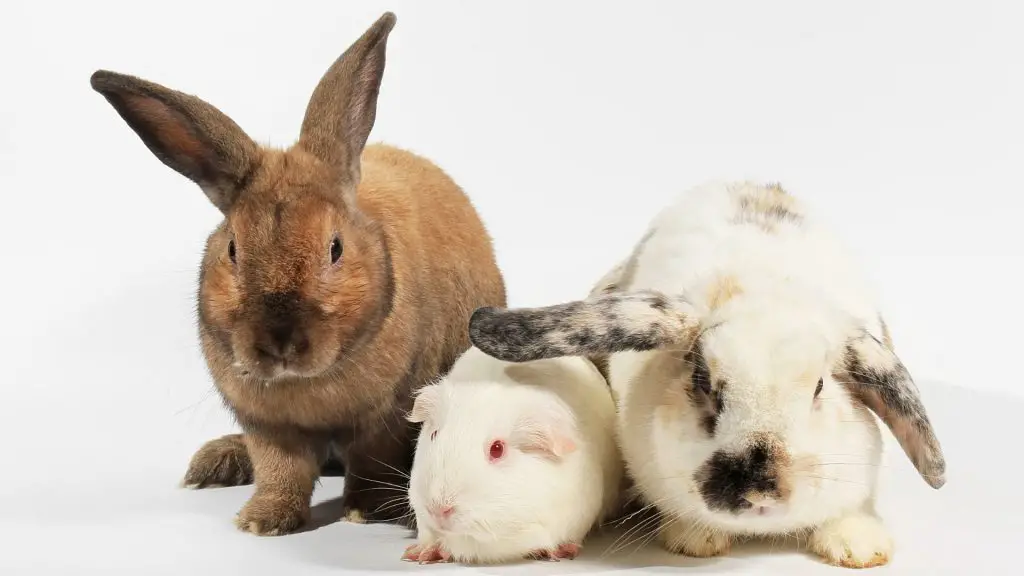
Differences in behavior and communication often result in misunderstandings and ugly clashes between the two. There are serious risks that come with housing them together. In spite of these risks, there are cases in which a rabbit and a guinea pig tolerate each other, even getting along at times.
In these cases, they shouldn’t be separated because neither animal tolerates sudden changes very well. If after knowing the risks a caretaker still decides to house the pair together, then they must provide a secret hiding place for the guinea pig that’s too small for the rabbit to enter. Hideouts are an important part of the guinea pig’s healthy life.
Guinea Pig vs. Rabbit | Which One to Choose as a Pet?
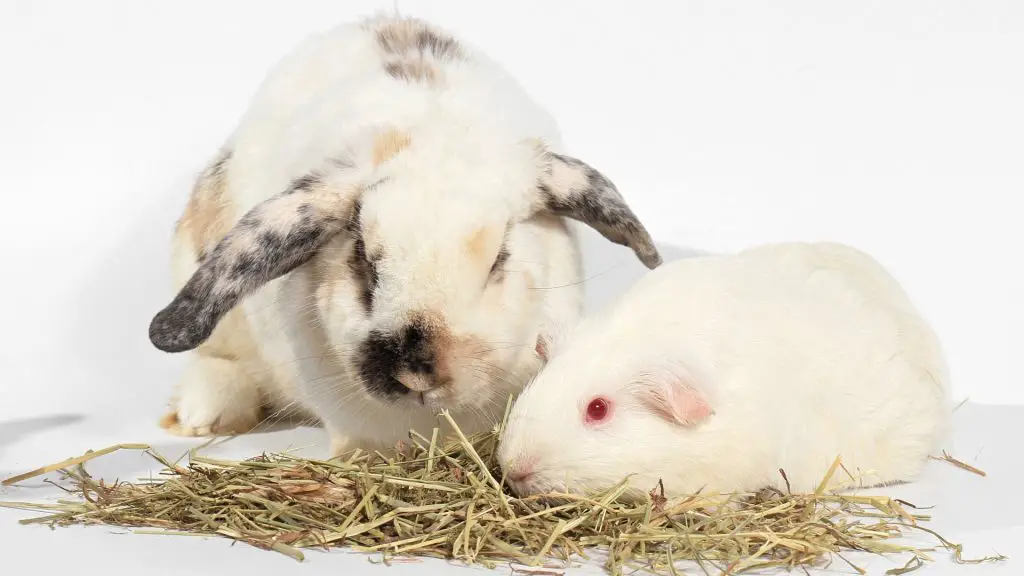
If you can’t decide which one you want to get as a pet, don’t worry because both of them make great pets. Guinea pigs and rabbits are quite similar when it comes to the difficulty level of taking care of them. However, one would argue that guinea pigs are slightly more easygoing and require less supervision. Nevertheless. they both need a lot of attention and love.
But there are also some more important differences, such as their personality because rabbits tend to be more aggressive than guinea pigs. Also, rabbits are larger in size. Because of that, they will need more food and more space for running and playing.
For its lifespan, rabbits usually live longer than guinea pigs. Their lifespan is around 8-12 years and guinea pigs tend to live between 4 and 8 years. No matter what you choose, you are going to get a new valuable member of your household.
Can Guinea Pigs Eat Rabbit Food?
Guinea pigs can’t eat rabbit food even though they are both herbivores. Food for rabbits simply doesn’t have enough vitamin C for guinea pigs. It’s important to feed guinea pigs with food that is rich in vitamin C, as they can’t produce this vitamin on their own. With vitamin C deficiency, guinea pigs can get a very serious disease called scurvy.
Also, some ingredients in rabbit’s food can be a hazard to guinea pigs. This type of food can contain too much protein, fat, or even some antibiotics that aren’t good for guinea pigs. It would be hard for guinea pigs to digest food for rabbits and possibly, they can even get allergic reactions from it.
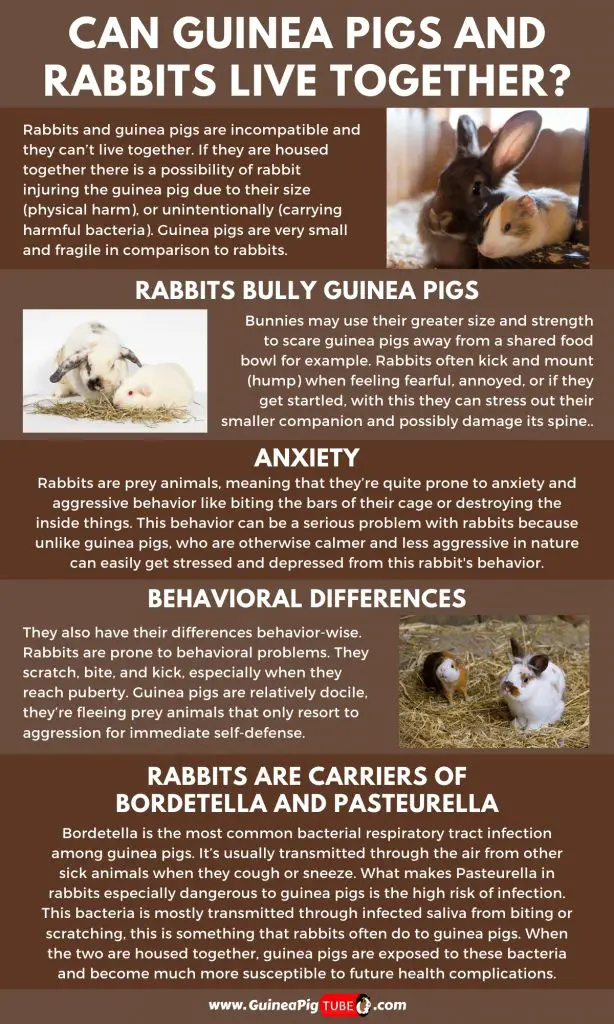
Summary
If you were planning to house guinea pig and a rabbit together, now you know that you probably shouldn’t. There are many problems that can arise but probably the most important one is that rabbits carry bacteria that are very dangerous for guinea pigs. This reason alone makes them incompatible. They even have different nutritional needs which can make things even more complicated. Simply, it is best to have them with their own kind.
List of Sources
Pasteurella Multocida and Bordetella Bronchiseptica Infections in Rabbits
Aggressiveness, Mating Behaviour and Lifespan of Group Housed Rabbit Does
Nutrient Requirements of Laboratory Animals: Fourth Revised Edition
